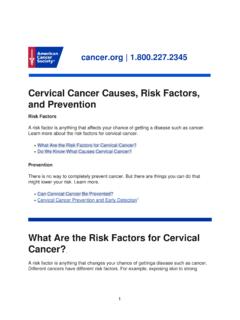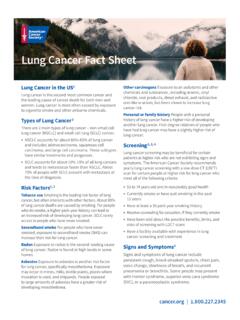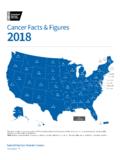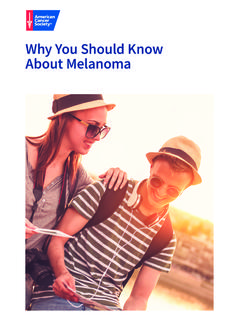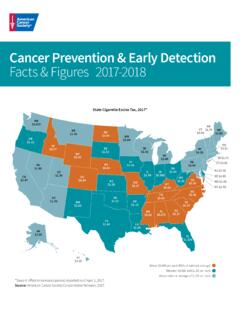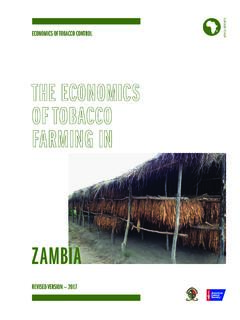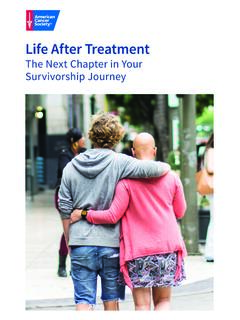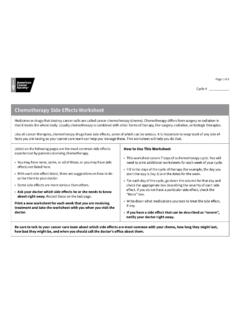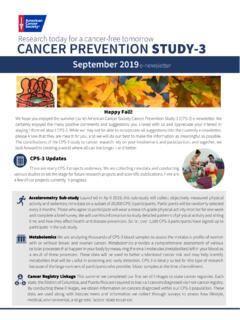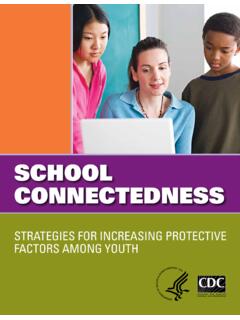Transcription of Colorectal Cancer Causes, Risk Factors, and Prevention
1 Colorectal Cancer causes , Risk Factors, and Prevention | FactorsA risk factor is anything that increases your chance of getting a disease such as more about the risk factors for Colorectal Cancer Risk FactorslWhat causes Colorectal Cancer ?lPreventionThere's no way to completely prevent Cancer . But there are things you can do that mighthelp lower your risk. Learn Colorectal Cancer Be Prevented?lGenetic Testing, Screening, and Prevention for People with a Strong Family Historyof Colorectal CancerlColorectal Cancer Risk factors A risk factor is anything that raises your chance of getting a disease such as cancers have different risk factors . Some risk factors , like smoking, can bechanged. Others, like a person s age or family history, can t be Cancer | having a risk factor, or even many, does not mean that you will get the disease. Andsome people who get the disease may not have any known risk have found several risk factors that might increase a person s chance ofdeveloping Colorectal polyps or Colorectal Cancer risk factors you can changeMany lifestyle-related factors have been linked to Colorectal Cancer .
2 In fact, the linksbetween diet, weight, and exercise and Colorectal Cancer risk are some of the strongestfor any type of overweight or obeseIf you are overweight or obese1 (very overweight), your risk of developing and dyingfrom Colorectal Cancer is higher. Being overweight raises the risk of colon and rectalcancer in people, but the link seems to be stronger in men. Getting to and staying at ahealthy weight2 may help lower your risk. Not being physically activeIf you're not physically active, you have a greater chance of developing colon moderate to vigorous physical activity3 can help lower your types of dietsA diet that's high in red meats (such as beef, pork, lamb, or liver) and processed meats(like hot dogs and some luncheon meats) raises your Colorectal Cancer meats at very high temperatures (frying, broiling, or grilling) creates chemicalsthat might raise your Cancer risk. It s not clear how much this might increase yourcolorectal Cancer a low blood level of vitamin D may also increase your a healthy eating pattern4 that includes plenty of fruits, vegetables, and wholegrains, and that limits or avoids red and processed meats and sugary drinks probablylowers Cancer | who have smoked tobacco for a long time are more likely than people who don'tsmoke to develop and die from Colorectal Cancer .
3 Smoking is a well-known cause oflung Cancer , but it's linked to a lot of other cancers5, too. If you smoke and want to knowmore about quitting, see our Guid6e to Quitting useColorectal Cancer has been linked to moderate to heavy alcohol8 use. Even light-to-moderate alcohol intake has been associated with some risk. It is best not to drinkalcohol. If people do drink alcohol, they should have no more than 2 drinks a day formen and 1 drink a day for women. This could have many health benefits, including alower risk of many kinds of Cancer risk factors you cannot changeBeing olderYour risk of Colorectal Cancer goes up as you age. Younger adults can get it, but it'smuch more common after age 50. Colorectal Cancer is rising among people who areyounger than age 50 and the reason for this remains unclear. A personal history of Colorectal polyps or Colorectal cancerIf you have a history of adenomatous polyps10 (adenomas), you are at increased risk ofdeveloping Colorectal Cancer .
4 This is especially true if the polyps are large, if there aremany of them, or if any of them show you've had Colorectal Cancer , even though it was completely removed, you are morelikely to develop new cancers in other parts of the colon and rectum. The chances ofthis happening are greater if you had your first Colorectal Cancer when you personal history of inflammatory bowel diseaseIf you have inflammatory bowel disease (IBD), including either ulcerative colitis orCrohn s disease, your risk of Colorectal Cancer is is a condition in which the colon is inflamed over a long period of time. People whohave had IBD for many years, especially if untreated, often develop is a term used to describe cells in the lining of the colon or rectum that look3 American Cancer | , but are not Cancer cells. They can change into Cancer over you have IBD, you may need to start getting screened for Colorectal Cancer when youare younger and be screened more bowel disease is different from irritable bowel syndrome (IBS), which doesnot appear to increase your risk for Colorectal family history of Colorectal Cancer or adenomatous polypsMost Colorectal cancers are found in people without a family history of Colorectal , as many as 1 in 3 people who develop Colorectal Cancer have other familymembers who have had it.
5 People with a history of Colorectal Cancer in a first-degree relative (parent, sibling, orchild) are at increased risk. The risk is even higher if that relative was diagnosed withcancer when they were younger than 50 , or if more than one first-degree relative reasons for the increased risk are not clear in all cases. Cancers can run in thefamily because of inherited genes, shared environmental factors , or some combinationof family members who have had adenomatous polyps is also linked to a higherrisk of colon Cancer . (Adenomatous polyps are the kind of polyps that can becomecancer.)If you have a family history of adenomatous polyps or Colorectal Cancer , talk with yourdoctor about the possible need to start screening before age 45. If you've hadadenomatous polyps or Colorectal Cancer , it s important to tell your close relatives sothat they can pass along that information to their doctors and start screening at the an inherited syndromeAbout 5% of people who develop Colorectal Cancer have inherited gene11 changes(mutations) that cause family Cancer syndromes and can lead to them getting most common inherited syndromes linked with Colorectal cancers are Lynchsyndrome (hereditary non-polyposis Colorectal Cancer , or HNPCC) and familial4 American Cancer | polyposis (FAP), but other rarer syndromes can increase colorectalcancer risk, syndrome (hereditary non-polyposis colon Cancer or HNPCC)Lynch syndrome is the most common hereditary Colorectal Cancer syndrome.
6 Itaccounts for about 2% to 4% of all Colorectal cancers. In most cases, this disorder iscaused by an inherited defect in either the MLH1, MSH2 or MSH6 gene, but changes inother genes can also cause Lynch syndrome. These genes normally help repair DNAthat has been cancers linked to this syndrome tend to develop when people are relatively with Lynch syndrome can have polyps, but they tend to only have a few. Thelifetime risk of Colorectal Cancer in people with this condition may be as high as 50% ,but this depends on which gene is with this condition also have a very high risk of developing Cancer of theendometrium (lining of the uterus). Other cancers linked with Lynch syndrome includecancer of the ovary, stomach, small intestine, pancreas, kidney, prostate, breast,ureters (tubes that carry urine from the kidneys to the bladder), and bile duct. Peoplewith Turcot syndrome (a rare inherited condition) who have a defect in one of the Lynchsyndrome genes are at a higher risk of Colorectal Cancer as well as a specific type ofbrain Cancer called glioblastoma.
7 For more on Lynch syndrome, see What causes Colorectal Cancer ?, Can ColorectalCancer Be Prevented?, and Family Cancer adenomatous polyposis (FAP)FAP is caused by changes (mutations) in the APC gene that a person inherits fromparents. About 1% of all Colorectal cancers are caused by the most common type of FAP, hundreds or thousands of polyps develop in aperson s colon and rectum, often starting at ages 10 to 12 years. Cancer usuallydevelops in 1 or more of these polyps as early as age 20. By age 40, almost all peoplewith FAP will have colon Cancer if their colon hasn t been removed to prevent it. Peoplewith FAP also have an increased risk for cancers of the stomach, small intestines,pancreas, liver, and some other are 3 sub-types of FAP:5 American Cancer | attenuated FAP or AFAP, patients have fewer polyps (less than 100), andcolorectal Cancer tends to occur at a later age (40s and 50s).lGardner syndrome is a type of FAP that also causes non- Cancer tumors of theskin, soft tissue, and syndrome is a rare inherited condition in which people have a higher risk ofmany adenomatous polyps and Colorectal Cancer .
8 People with Turcot syndromewho have the APC gene are also at risk of a specific type of brain Cancer calledmedulloblastoma. lRare inherited syndromes linked to Colorectal cancerPeutz-Jeghers syndrome (PJS): People with this inherited condition tend to havefreckles around the mouth (and sometimes on their hands and feet) and a specialtype of polyp called hamartomas in their digestive tracts. These people are at amuch higher risk for Colorectal Cancer , as well as other cancers, such as breast,ovary, and pancreas. They usually are diagnosed at a younger than usual age. Thissyndrome is caused by mutations in the STK11 (LKB1) gene. lMUTYH-associated polyposis (MAP): People with this syndrome develop manycolon polyps. These will almost always become Cancer if not watched closely withregular colonoscopies. These people also have an increased risk of other cancersof the GI (gastrointestinal) tract and thyroid. This syndrome is caused by mutationsin the MUTYH gene (which is involved in proofreading the DNA and fixing anymistakes) and often leads to Cancer at a younger age.
9 LSince many of these syndromes are linked to Colorectal Cancer at a young age and alsolinked to other types of Cancer , identifying families with these inherited syndromes isimportant. It lets doctors recommend specific steps such as screening and otherpreventive measures when the person is younger. Information on risk assessment, andgenetic counseling and testing for these syndromes can be found in Genetic Testing,Screening, and Prevention for People with a Strong Family History of racial and ethnic backgroundAfrican Americans have the highest Colorectal Cancer incidence and mortality rates of allracial groups in the of Eastern European descent (Ashkenazi Jews) have one of the highest colorectal6 American Cancer | risks of any ethnic group in the world. Having type 2 diabetesPeople with type 2 (usually non-insulin dependent) diabetes have an increased risk ofcolorectal Cancer . Both type 2 diabetes and Colorectal Cancer share some of the samerisk factors (such as being overweight and physical inactivity).
10 But even after takingthese factors into account, people with type 2 diabetes still have an increased risk. Theyalso tend to have a less favorable prognosis (outlook) after with unclear effects on Colorectal Cancer riskNight shift workSome studies suggest working a night shift regularly might raise the risk of rectalcancer. This might be due to changes in levels of melatonin, a hormone that respondsto changes in light. More research is needed. Previous treatment for certain cancersSome studies have found that men who survive testicular Cancer seem to have a higherrate of Colorectal Cancer and some other cancers. This might be because of thetreatments they have received, such as radiation studies have suggested that men who had radiation therapy to treat prostatecancer might have a higher risk of rectal Cancer because the rectum receives someradiation during treatment. Most of these studies are based on men treated in the 1980sand 1990s, when radiation treatments were less precise than they are today.
